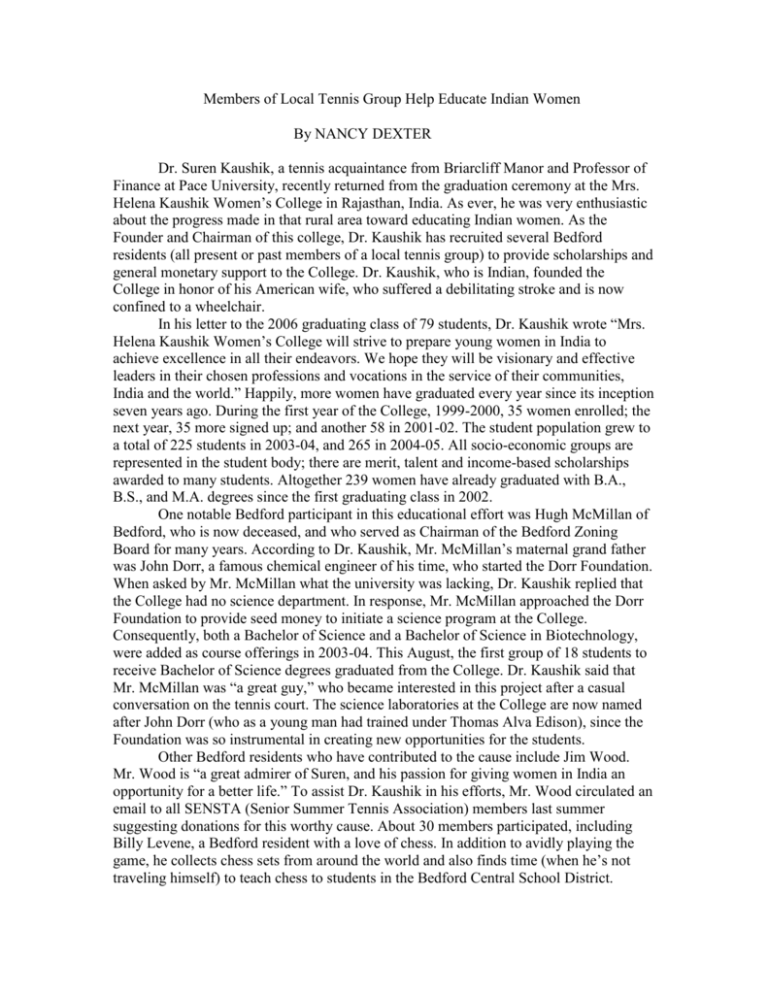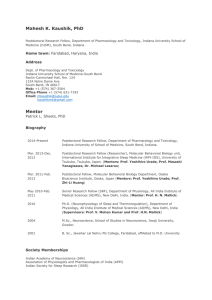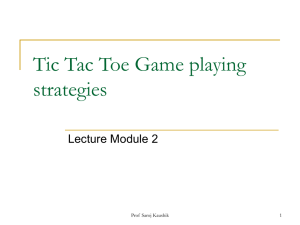Women`s College in India by Nancy Dexter
advertisement

Members of Local Tennis Group Help Educate Indian Women By NANCY DEXTER Dr. Suren Kaushik, a tennis acquaintance from Briarcliff Manor and Professor of Finance at Pace University, recently returned from the graduation ceremony at the Mrs. Helena Kaushik Women’s College in Rajasthan, India. As ever, he was very enthusiastic about the progress made in that rural area toward educating Indian women. As the Founder and Chairman of this college, Dr. Kaushik has recruited several Bedford residents (all present or past members of a local tennis group) to provide scholarships and general monetary support to the College. Dr. Kaushik, who is Indian, founded the College in honor of his American wife, who suffered a debilitating stroke and is now confined to a wheelchair. In his letter to the 2006 graduating class of 79 students, Dr. Kaushik wrote “Mrs. Helena Kaushik Women’s College will strive to prepare young women in India to achieve excellence in all their endeavors. We hope they will be visionary and effective leaders in their chosen professions and vocations in the service of their communities, India and the world.” Happily, more women have graduated every year since its inception seven years ago. During the first year of the College, 1999-2000, 35 women enrolled; the next year, 35 more signed up; and another 58 in 2001-02. The student population grew to a total of 225 students in 2003-04, and 265 in 2004-05. All socio-economic groups are represented in the student body; there are merit, talent and income-based scholarships awarded to many students. Altogether 239 women have already graduated with B.A., B.S., and M.A. degrees since the first graduating class in 2002. One notable Bedford participant in this educational effort was Hugh McMillan of Bedford, who is now deceased, and who served as Chairman of the Bedford Zoning Board for many years. According to Dr. Kaushik, Mr. McMillan’s maternal grand father was John Dorr, a famous chemical engineer of his time, who started the Dorr Foundation. When asked by Mr. McMillan what the university was lacking, Dr. Kaushik replied that the College had no science department. In response, Mr. McMillan approached the Dorr Foundation to provide seed money to initiate a science program at the College. Consequently, both a Bachelor of Science and a Bachelor of Science in Biotechnology, were added as course offerings in 2003-04. This August, the first group of 18 students to receive Bachelor of Science degrees graduated from the College. Dr. Kaushik said that Mr. McMillan was “a great guy,” who became interested in this project after a casual conversation on the tennis court. The science laboratories at the College are now named after John Dorr (who as a young man had trained under Thomas Alva Edison), since the Foundation was so instrumental in creating new opportunities for the students. Other Bedford residents who have contributed to the cause include Jim Wood. Mr. Wood is “a great admirer of Suren, and his passion for giving women in India an opportunity for a better life.” To assist Dr. Kaushik in his efforts, Mr. Wood circulated an email to all SENSTA (Senior Summer Tennis Association) members last summer suggesting donations for this worthy cause. About 30 members participated, including Billy Levene, a Bedford resident with a love of chess. In addition to avidly playing the game, he collects chess sets from around the world and also finds time (when he’s not traveling himself) to teach chess to students in the Bedford Central School District. According to Dr. Kaushik, he owns more sets from India than from anywhere else, perhaps because the game of chess began in India. Mr. Levene also initiated a scholarship fund for the College after receiving Mr. Wood’s letter, and recently made a videoinstructing students on how to play chess. During his latest trip, Dr. Kaushik delivered the video to the College. There is even some talk of starting an annual Chess Championship, since once the students learn to play chess from the videos, the next step will be to have competitions. Local political supporters of the College include Sen. Hillary Rodham Clinton, Rep. Nita Lowey, New York State Assemblywoman Sandra Galef and Richard Ottinger, Dean Emeritus of the Pace University Law School, former Representative in the House of Representative from Westchester and a founding staff member of the Peace Corps. This August, Dr. Kaushik traveled to India with Assemblywoman Sandra Galef and several others for the graduation, which was followed by a two-day National Seminar on “Gender Violence and Witness Protection,” also held at the College. Ms. Galef said she decided to go since she had always wanted to visit India and this trip presented a good opportunity. The visiting American contingent consisted of Assemblywoman Galef, who spoke about women’s rights; Don Plunkett from Cortlandt Manor, President of The United Group of Companies and his young daughter Kayla Plunkett (12) who herself decided to donate $600 of her own savings from weekly pocket money for an annual scholarship (her sister Mariah(14) has also visited the College and has her own scholarship); Shobha Kaushik, a student at the University of Rochester, her brother Shorav Kaushik, a student at Brooklyn Law School, and their mother Durga Kaushik, a resident of Briarcliff Manor and a nursery school teacher in Ossining, and several other women from New Jersey and Virginia. One of them, Barbara Lipton of South Orange, New Jersey, organized a photography contest at the College. She collected 45 disposable Kodak cameras and sent them to students to photograph life in villages around the College. About 40 photos were selected for a weeklong exhibition; four students were given prizes for best photos during the graduation ceremony. The first U.S. showing of the exhibition will be at The Ethical Culture Society of Maplewood, New Jersey on November 12, 2006. Assemblywoman Galef said the trip from the airport in Delhi to the College was longer than expected, with many one-lane roads meandering through small villages and cows and goats wandering in the roads. The College is in a rural area, and Ms. Galef is quite sure “most of these women would not have the opportunity to go to college if it were not for this place.” Wondering why Dr. Kaushik chose this particular area, Ms. Galef replied that he grew up nearby and has had such success in America that he wants to “give back” to his homeland. During the trip, she met many government representatives. She noted that everywhere she went, people were friendly and hospitable--everyone wanted to cook you a meal. She was amazed that on a side visit to Jaipur, she had “five breakfasts in one day.” She noted that there is a security fence around the college, a reflection on the male-oriented culture and women’s role in India. Since there are no hotels nearby, she stayed in a guest house on the campus built to accommodate visitors. Dr. Kaushik also wants to create good on-campus housing for teachers to induce them to stay. The Assemblywoman visited the dormitories and said the girls “looked gorgeous in their bright saris; some spoke English, some Hindi.” According to her, a 23-year-old model and dancer Deepal Pandya, who has trained with the famous John Robert Powers modeling agency, from New Jersey is currently teaching the girls “presentation and poise.” The graduation ceremony itself was reminiscent of a graduation in America, taking place under a large outdoor tent. Assemblywoman Galef wore a black robe with purple trim, as did other American visitors on the podium, and she was thrilled to be handing out diplomas to the graduates. Dr. Kaushik asked her to write a congratulatory letter for the 2006 Year Book. This glossy publication had photos of all the graduates, accompanied by a bio and individual comments about why the college was important to them. When asked their thoughts, one graduate wrote “College education must be compulsory for every woman;” another wrote “It gave me confidence.” Most of the graduates say they will support their Alma Mater by “doing publicity” and inspiring other women to attend the college. The Gender Violence and Witness Protection Seminar that took place for two days following the graduation was fascinating, according to Assemblywoman Galef, and very well-attended. She noted that she “had friendly disagreements with some men, who seemed to feel that women make these things up.” Oddly enough, however, they all seemed familiar with the O.J. Simpson case. She said officials are “trying to educate people, but the police are not on the side of taking action.” One difference from American culture, she said, is that “Indian families all live together, so how do you remove one individual—it’s very difficult.” According to her most of the students do not live at the College, but instead commute by bus every day, since many families prefer that their daughters live at home. She pointed out that India has a long way to go in educating the populace, since only 1½% of Indian women are college educated and 5% of men. Many who can afford to do so leave and go to school elsewhere. However, government officials want to begin educating more young people in India, and keeping them there. Assemblywoman Galef made another point that India is so close to Pakistan, and it would be in the world’s best interests for Indian young people to become better educated so that they will “have a reason to live,” thus avoiding the hopelessness of many young people around the world who wind up being recruited by terrorists. For more information about the College, and how you might help with this effort, contact Dr. Suren Kaushik at (914) 762-6168 or email Skaushik@pace.edu. Information is also available on the website www.regnic and www.helenakaushik.org.








